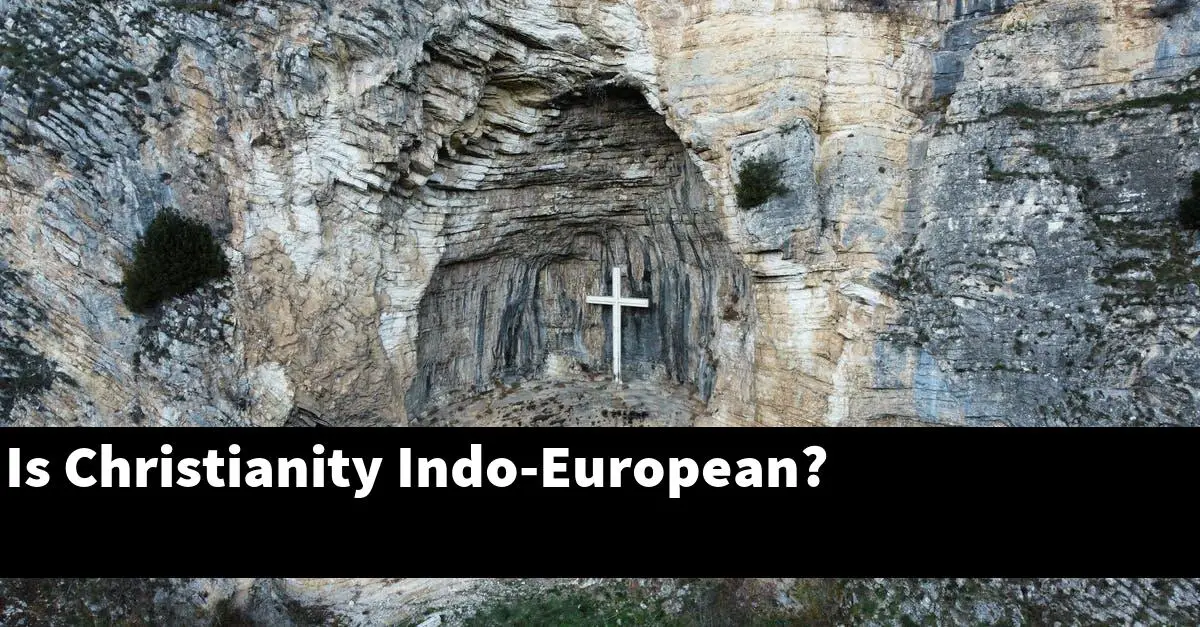The essay “Is Christianity Indo-European?” by James P. Mallory explores the possibility that Christianity may have its roots in the Indo-European culture. Mallory looks at the similarities between Christianity and other Indo-European religions, and argues that Christianity may have arisen from a synthesis of various Indo-European traditions.
What religion is Indo-European?
It depends on the definition of religion. For the purposes of this discussion, religion will be defined as a set of beliefs and practices associated with a particular group or sect of people.
It is worth noting that there is no one Indo-European religion, as there are a number of different Indo-European religious traditions.
One of the most common definitions of religion is that it is a system of beliefs about the existence of a deity or gods. This is certainly true of Indo-European religions, as many of them believe in a pantheon of gods and goddesses.
Some of the most popular Indo-European religions include Hinduism, Buddhism, and Christianity.
Each Indo-European religion has its own set of doctrines and practices. While they share some common features, each religion is unique and has its own history and origins.
This makes it difficult to compare and contrast Indo-European religions in an objective way.
Is Christianity European?
There are a lot of perspectives on this question, and it’s complex. Generally speaking, it can be said that Christianity is European in origin, because it was first introduced to Europe by the Romans.
However, this is not a hard and fast rule, and there are many different Christian denominations across the continent. Additionally, Christianity has been heavily influenced by various cultures and religions over the years, so it isn’t entirely European in origin.
What people are Indo-European?
People who share similar linguistic and cultural roots are known as Indo-European. This group includes speakers of languages such as English, Spanish, French, German, Italian, Russian, and Sanskrit.
The Indo-European languages are thought to have originated in central and eastern Europe, and are now spoken by millions of people around the world.
What type of Christianity is in Europe?
There is no single, definitive answer to this question as there is a variety of Christian denominations practiced throughout Europe. While there are some general trends, such as the predominance of Catholic Christianity in southern and eastern Europe, there is a great deal of variation within each region.
For example, Protestantism is more prevalent in northern Europe, while Orthodox Christianity is more common in eastern Europe. Additionally, there are also a number of Eastern Orthodox churches in Europe that are not affiliated with the Russian Orthodox Church.
Are Hindu gods Indo-European?
There is no consensus on whether or not Hindu gods are Indo-European. Some archaeologists and linguists argue that they are, while others say that they are not.
There is evidence that the Indus Valley Civilization, which flourished in present-day Pakistan around 3000 BC, may have been influenced by Indo-European languages. However, there is no definitive proof that the gods of Hinduism are Indo-European.
Is Hindu Indo-European?
There is no consensus among linguists on whether or not the Indo-European languages are Hindu in origin. Some linguists believe that Indo-European is a language family that evolved in northern India, while others believe that it originated in Europe.
Regardless of its origins, there is evidence to suggest that the Indo-European languages share a common ancestor.
Where did Christianity originate from?
Christianity is a religion that originated from the Middle East in the first century AD. The religion began as a Jewish sect, but it soon spread to other parts of the world. Christianity is based on the teachings of Jesus Christ, who was a Jewish prophet.
Christians believe that Jesus was the son of God and the savior of the world.
What is the origin of Christianity?
Christianity is the largest religion in the world, with more than 2.1 billion followers around the globe. Christianity began as a small sect of Judaism in the mid-1st century AD, and its original teachings focused on ethical and moral teachings.
However, over time, Christianity grew and evolved into a much larger religion, with a wide range of beliefs and practices. Today, Christianity is considered to be a monotheistic faith, which believes in one God who created the universe and all that exists in it.
Christianity also believes in the teachings of Jesus Christ, who is considered the son of God and the savior of humanity. Christianity has a long and complicated history, and there are many different versions of Christianity across the world.
Who brought Christianity to Europe?
The spread of Christianity throughout Europe can be traced back to the mid-1st century AD. At that time, a Jewish teacher named Jesus of Nazareth lived and preached in the Galilee region of Israel. Many people believed in him, and some even followed his teachings.
In order to avoid persecution from the Roman government, Jesus and his followers fled to Egypt. There, they faced several challenges, including harsh conditions and violence.
After a few years, Jesus and his disciples made their way back to Palestine, where they began preaching in small towns and villages.
Eventually, the gospel of Jesus spread to Rome, where Emperor Constantine had a serious conversion experience. Constantine decided to support Jesus and his followers, and soon the religion became popular throughout the empire.
Christianity continued to spread throughout Europe, and by the end of the 4th century AD, it had become the dominant religion in most areas. This process was helped by the spread of literacy and the development of the Roman Empire.
As people learned about Christianity, they began to convert and adopt the religion.
Is Hebrew Indo-European?
The question of whether Hebrew is an Indo-European language has been debated for centuries, and the answer remains unresolved. Some linguists argue that Hebrew is a member of the Indo-European language family, while others maintain that it is not.
While the evidence is inconclusive, it seems likely that Hebrew is at least somewhat Indo-European. Some similarities between Hebrew and other Indo-European languages are undeniable, and it is likely that Hebrew borrowed these features from its neighbors.
Is Arabic Indo-European?
Arabic is classified as an Indo-European language. This means that Arabic shares many commonalities with languages spoken in Europe and the Middle East.
For example, Arabic has a system of declensions, which is common to Indo-European languages. Arabic also has a number of words that are unique to Arabic, but which are also found in Indo-European languages.
Therefore, it is reasonable to assume that Arabic is an Indo-European language.
Is English Indo-European?
There is no consensus on whether English is Indo-European, but it is generally agreed that English, Spanish, Portuguese, Romanian, Turkish, and Greek are all members of the Indo-European family of languages. Indo-European languages are thought to have originated in the Middle East some time in the Neolithic era, and they spread throughout Europe and the Mediterranean region.
They are largely spoken today in countries that were formerly part of the Soviet Union, Eastern Europe, and the Middle East.
Conclusion
The short answer is no, Christianity is not Indo-European. The long answer is a bit more complicated.
Christianity has its roots in Judaism, which is a Semitic religion. However, Christianity spread throughout the world and was adopted by many different cultures.
As a result, it has been influenced by various belief systems, including Indo-European ones.


